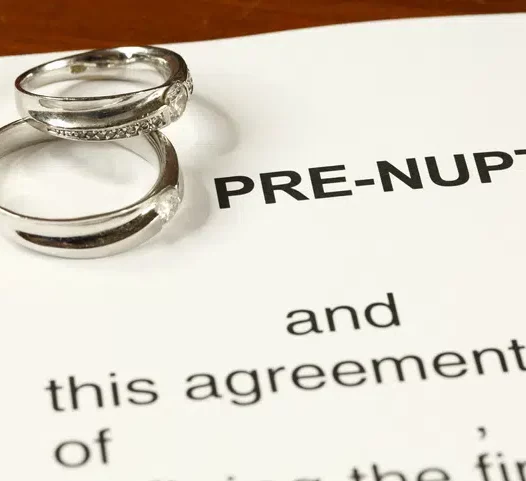Prenuptial Agreement Lawyer in Phoenix, Arizona
As top Phoenix estate planning lawyers , we understand the importance of asset protection in all of its forms. When you need help arranging your finances to secure your legacy, Copper State Planning- Home is here for you. Call us at (480) 442-6413 to schedule a consultation today.
When most people get married, they assume it’s for life—even though roughly half of all marriages end in divorce. And any attempt at financial protection, especially the suggestion of a prenup, is often seen as unromantic or cynical by others.
However, they couldn’t be more wrong.
There’s nothing unromantic about protecting yourself or allowing your partner to do so. Contrary to popular belief, these legal agreements aren’t designed to cheat a spouse out of what they deserve. Rather, they exist to protect people from a variety of situations, from financial manipulation to the untimely death of a spouse.
Before you enter into a marriage, you owe it to yourself and your future spouse to do your due diligence. If you think a prenuptial agreement may be right for you, you don’t have to figure it out on your own. The prenuptial agreement lawyers at Copper State Planning can help you explore your options for asset protection.

Prenuptial Agreements
Need legal advice now? Our prenuptial agreement lawyers are here for you. After a thorough evaluation of your situation, we’ll suggest the best strategies to secure your legacy for years to come. Visit us online to contact –schedule a case evaluation.
In simplest terms, a prenuptial agreement is a premarital contract between two people. It establishes how certain assets, including real estate and personal property, will be handled in the event of the marriage’s dissolution. To be considered valid, the prenuptial agreement must be finalized before the exchange of wedding vows.
Who Needs a Prenuptial Agreement?
The decision to get a prenup is a personal one, and there is no right or wrong answer. However, this contract can provide useful planning tool to couples who value contingency plans or find themselves in one of the following situations:
- One or both people have significant assets.
- One or both people have children from a previous marriage.
- One party is significantly wealthier than the other, owns a business, is much older or is already retired.
- One party will be supporting the other while they pursue a degree program.
- One party is bringing substantial debt into the marriage.
- One or both parties are anticipating a large inheritance.
Any of these scenarios have the potential to be contentious, especially if married couples don’t make a plan before they occur. Having a legal agreement in place to address these contingencies takes the guesswork out of what could otherwise be a tense situation.
Advantages of Signing a Prenuptial Agreement
Most people understand that a prenuptial agreement is capable of shielding them from significant financial losses in a divorce. However, many couples aren’t aware of their more subtle advantages, many of which aren’t financial. Here are some of the most notable benefits of signing a prenup:
- A comprehensive plan for how to handle a partner’s incapacitation or death
- Protection from a spouse’s debt in the event of divorce
- Asset protection for lifetime earnings in later-in-life marriages
- A clear understanding of ownership for both separate property and marital property
- Protection for children from previous marriages
- Improved communication between spouses
- A clear understanding of life insurance provisions
- Smoother legal processes in the event of separation
- Conflict prevention
- Peace of mind
Make no mistake: Prenups aren’t for everyone. However, if you’re interested in exploring whether a prenuptial agreement is right for your marriage, you shouldn’t let anyone deter you. Feel free to contact our compassionate Prenuptial Agreement Lawyer to discuss your options.
Arizona Prenuptial Agreement Lawyer
In order for a prenuptial agreement to be considered valid in Arizona, it must meet a handful of requirements. It must be put in writing and signed by both parties before the marriage, and each party must have had an opportunity to consult with their own attorney before signing it.
Limitations of a Prenuptial Agreement
Even after meeting these criteria, a prenuptial agreement isn’t always enforceable. According to Arizona law, a prenuptial agreement may be “unconscionable” and thus invalid if one of the spouses can prove any of the following:
- They didn’t sign the agreement voluntarily.
- They weren’t given full disclosure of the other party’s property or financial obligations.
- They didn’t voluntarily and expressly waive their rights to financial disclosure in writing.
- They didn’t have (or couldn’t have) sufficient knowledge of the other party’s property and financial obligations.
It’s up to the court to decide whether or not a prenuptial agreement is unconscionable and should be voided. The court can void premarital agreements that eliminate spousal support, alimony or child support results in one spouse requiring public assistance.
What Should a Prenup Cover?
Prenups can address an array of assets, depending on the couple’s financial situation. However, a few topics are more commonly addressed, such as each party’s responsibility to their children and how they’ll divide their marital assets and pre-marital debt in the event of divorce or separation.
Some prenuptial agreements also include provisions such as the financial obligations of each party during the marriage. Ultimately, it’s up to the couple to choose what should be covered in the contract; any topic that one party considers to be important is worth addressing.

Prenuptial Agreement FAQs
When it comes to prenuptial agreements, there are myriad factors to consider. However, couples planning to get married already have a lot on their plates and probably don’t have time for a lot of legal research.
If you have questions about prenup agreements in Arizona, it’s a good idea to consult an experienced Arizona prenuptial agreement lawyer. In the meantime, learn more about prenup contracts and how they work in our FAQ.
• How long does it take to create a prenuptial agreement?
After you’ve hired a prenup attorney, completing a contract can take anywhere from a few days to a couple weeks. It will depend on several factors, including the complexity of your assets and how long you negotiate with your soon-to-be spouse.
• What assets can I include in a prenuptial agreement?
Numerous assets can be included in a prenup, but some of the most important include investments, bank accounts, household items, debt, property, vehicles and businesses or professional practices.
• Can I modify my prenup?
State law allows spouses to file a postnuptial agreement and modify or amend their prenup by signing a written agreement. They can also choose to revoke the prenup, which cancels it entirely.
• What are common mistakes people make with prenups?
If you and your soon-to-be spouse are pursuing a prenup, make sure you take your time writing and reviewing the terms, and never sign under duress. Don’t make the mistake of using just one party’s lawyer, failing to disclose pertinent financial information or drafting a provision that would make your spouse eligible for state assistance in the event of a divorce.

Our Arizona Prenuptial Agreement
Lawyers Are Here to Help
At Copper State Planning, we understand that creating a prenuptial agreement is a big decision that should be made carefully. Each union is unique, and while marriage is the best decision that some couples ever make, it’s not sustainable for others; even when it is sustainable, it can tragically be cut short by a spouse’s death.
No one knows what the future holds, which is exactly what makes prenups so useful. Luckily, our estate planning law firm’s experienced prenuptial agreement lawyers can help you eliminate some of the guesswork. Ready to get started? Simply visit us online to contact -schedule a consultation or give us a call at (480) 442-6413.h your legacy guide.

